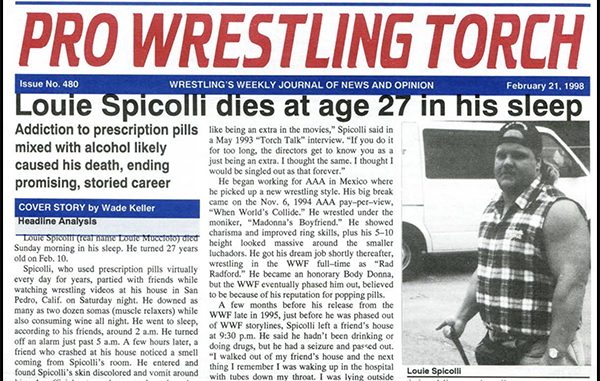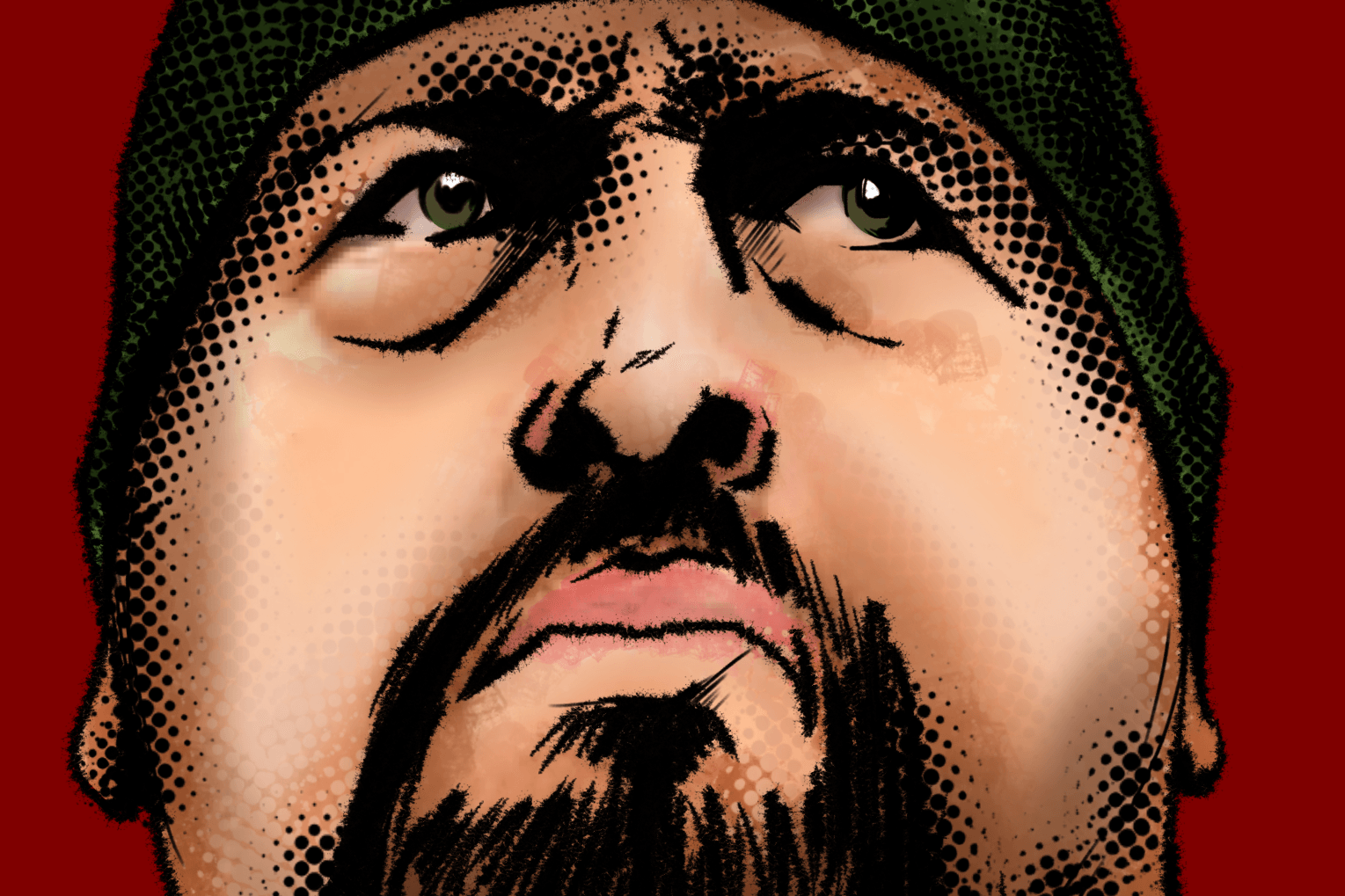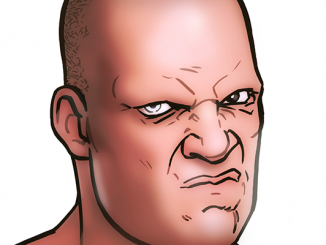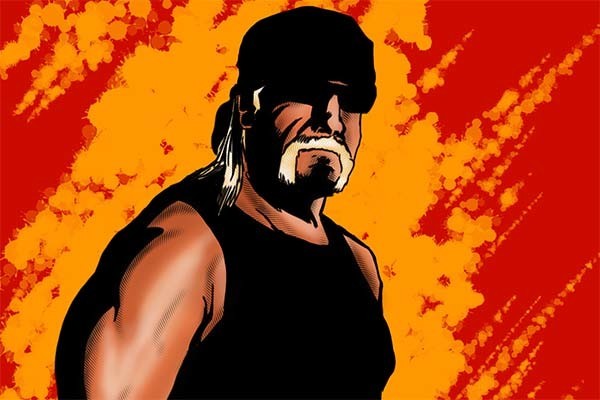
SPOTLIGHTED PODCAST ALERT (YOUR ARTICLE BEGINS A FEW INCHES DOWN)...
The following article was published in the Pro Wrestling Torch Newsletter 20 years ago this week (cover-dated Feb. 21, 1997). This was published the week pro wrestler Louie Spicolli died after an addiction to prescription pills and mixing it with alcohol caught up with him. This editorial sounded an alarm on a growing problem in pro wrestling, which would turn into high-profile headlines years later as wrestlers began dying in rapid succession due to the prescription pill problem.
KELLER EDITORIAL
HEADLINE: Prescription pills may kill others
By Wade Keller, PWTorch Editor
Louie Spicolli had a problem with prescription pills. A lot of other wrestlers currently have a problem with prescription pills. There is a good chance some of those wrestlers will also die, perhaps within weeks or months. Estimates by some wrestlers currently in the WWF and WCW say prescription pills are used by just about every wrestler periodically, by 70 percent regularly, and are abused at dangerous levels by 5-15 percent.
Wrestlers take prescription pills for a variety of reasons. As opposed to steroids, which are taken for cosmetic and strength purposes, prescription pills serve many purposes. Most wrestlers who take prescription pills take them because a doctor believes they are either helpful or necessary. If a wrestler is injured, he may take pain pills or muscle relaxers (downers) while he recovers. Some wrestlers take more and more pills with each dosage every day (or several times a day) in order to battle their increasing pain and their increasing tolerance for the given drug. That often leads to an addiction.
Others take prescription pills because they tried some from other wrestlers and liked the high they got from the uppers or the relaxation they felt from the downers. Then they learn what symptom they need in order to get them prescribed to them, then they tell their doctor that is their symptom, and the doctor, with good and proper intentions, prescribes them. If that doctor won’t increase the dosage a few months later when a wrestler builds up a tolerance for them, that wrestlers sees one or two or three other doctors who each gives him the recommended dosage. That adds up to enough to satisfy his addiction — and it’s all done legally without one doctor breaking a law or even medical ethics. Some doctors will prescribe pills in larger than necessary quantities because they don’t want to upset the “celebrity wrestler” who they want to remain friends with.
Prescription pills have become the recreational drug of choice among wrestlers. More so than cocaine or other illegal drugs, prescription pills are a quick high that is readily available and easy to find. “Everybody takes them,” says one wrestler from WCW. “The majority take them purely for recreational purposes. Most don’t have a problem like Louie did, though.” Wrestlers often drink at the bar, then go upstairs and pop their own pills or go room to room looking for a buddy who can supply them with a quick fix.
While it is not difficult to obtain prescriptions for pain pills, wrestlers still want to protect the doctors who prescribe them. The doctors who are most popular among wrestlers are doctors who are wrestling fans, who appreciate what wrestlers do for a living and the toll that takes on their bodies. One popular doctor within the last two months refused to prescribe any more pills to one preliminary wrestler in WCW, because he believed the wrestler was developing a problem with them. The wrestler threatened to “expose” the doctor for prescribing pills to wrestlers in excess quantities unless the doctor kept giving him pills. When other wrestlers, who liked the doctor and what he did for them, heard about it, that wrestler was banished in the locker room.
A few years ago when Vince McMahon believed Dr. Joel Hackett (whose prescriptions were found in Spicolli’s house) was prescribing pills to too many wrestlers, he banned him from WWF arenas for a while (the ban may still be in place). Dr. Hackett is among a few doctors who visit wrestlers in person. He visits when an event comes near Indianapolis where he lives. While a promoter might have good intentions, even if every doctor who prescribes pills to wrestlers were to stop tomorrow, there would be other doctors to take their place. Said one wrestler, “It might take a visit to five or six doctors before you’ll find one who will supply you with pills whenever you want them, but those doctors are out there.” Says another wrestler, who has taken prescription pills, “The smart boys get pills from their own doctor and keep quiet about it.” If a promoter were to ask a doctor which wrestlers he thinks were abusing pills, the doctor couldn’t answer due to doctor-patient confidentiality.
Some doctors are in it for the profit. Wrestlers are easy patients who are willing to pay a price to a doctor who doesn’t ask a lot of questions. Other doctors are “marks” for wrestlers, they’re “jock sniffers” who want to hang out with celebrities. With the wrestlers banding together informally to protect their sources for pills — and with promoters unable to police legal, medical prescriptions — the idea of preventing wrestlers from getting their hands on pills is impossible to achieve. And that assumes you’d want to ban them entirely.
The fact is, most wrestlers who use prescription pills, either for legitimate purposes or for recreational purposes, keeps the usage under reasonable control. There are many things in life that aren’t healthy for us that don’t kill us (alcohol, caffeine, fast food). Pain pills serve a legitimate purpose to help wrestlers get through painful injuries. Muscle relaxers help wrestlers deal with sleeping disorders that result from early morning flights, erratic schedules from week to week, and pains from back injuries and bumps and bruises.
If you can’t eliminate prescription pills, and if you shouldn’t eliminate them even if you could, then what is the solution to the problem of more pending deaths? There are several possible steps.
Self-policing is probably the most effective method. Louie Spicolli showed a lot of obvious signs of having a problem with prescription pills. He would take them at night to help get to sleep, but beyond that most who were around him believed he was addicted beyond that. Just last week Spicolli had taken some pills after a live WCW event. In the restaurant he was falling asleep from the pills. Another wrestler, angered by Spicolli’s public displays, slapped him across the back of the head and told him to get up and pay his bill. That story is not meant to disparage Spicolli (who I considered a personal friend), but to illustrate that Spicolli’s problem was well known among wrestlers.
If wrestlers would take strong stands against fellow wrestlers who have a problem, that might lead to an atmosphere where those with a problem would be more likely to seek help to avoid being banished from their primary social group. Just a few weeks before Brian Pillman’s death, he created a scene in an airport because he was pilled up. It embarrassed some fellow wrestlers and they feared his actions would prompt McMahon to drug test more stringently again, thus costing them their recreational pot smoking. In response, they planned to “beat him up” to try to send a message to him that his behavior wasn’t acceptable. Not to endorse the specific actions discussed among the wrestlers, but in general the attitude of just looking on and walking away is much worse. A wrestler especially feels heat among fellow wrestlers if it is perceived he is enabling or encouraging someone else to use pills who is trying to recover from an addiction.
Wrestlers who have a problem often don’t know it or won’t admit it. They believe they are under control and can quit any time. Wrestlers rationalize that their taking of pills is necessary to survive on the road and keep their job and support their family.
Education is another important tool for promoters to prevent future deaths. Deaths are not just sad and tragic in the sense that someone has died, but in a purely utilitarian sense, it hurts business. Not only does a company lose an investment, they risk a backlash from fans who think the promotion is full of drug addicts and they risk bad publicity that could cost them sponsors. It is in a promoter’s best interest to educate wrestlers. Wrestlers learn all they want to know from each other through word of mouth; at least that’s what most would say publicly. But privately, they admit they would like to know true facts. If a doctor spent 10 minutes in front of the entire roster explaining the side effects of various pills, which ones are most dangerous when mixed with alcohol, which ones are most addictive, what the signs are of a friend having a serious problem, and how others in the past have gotten past addictions, it could end up saving a life. Rather than preach against taking any for recreational purposes, have a doctor explain which are most dangerous when taken for that purpose. McMahon has often had Dr. DiPasquale speak to WWF wrestlers about drugs in that manner.
It’s also important for every promoter, in writing if possible, to tell wrestlers that no matter who they are, they matter, and if they have a problem, the promotion is there to help them. Put it in writing that the promotion will pay for drug treatment. McMahon pays for treatment — it’s in his contracts with wrestlers — although he can recoup half of the cost over time (although he doesn’t usually take advantage of that clause).
Drug testing may be counter-productive. As strange as it sounds, drug testing may be one of the big causes of prescription pills becoming so popular. One WWF wrestler with a problem with pain pills says he would have never gone down the path of pain pills if he hadn’t been scared of being suspended for smoking pot. Smoking marijuana isn’t healthy, but it might be a better substitute than taking pain pills for the same reasons. Wrestlers take pills for entertainment purposes (Said one wrestler, “When you’re the entertainment, who entertains you?”). At 11 p.m. or 1 a.m., after the live event has ended and everyone has gathered at the hotel, many wrestlers look for an escape from the pain of taking bumps, from the rigors of the road schedule, and from the stress of being away from their families. If they are going to take a drug to relax and escape, marijuana is a safer choice than somas, halcyon, and other prescription pills. Several wrestlers with first-hand experience say pot is much less addictive and much less dangerous in the long run. Mixing marijuana with alcohol pales in comparison to the danger of mixing common prescription pills with drinking. But if a promotion tests for pot, wrestlers will take pills instead to avoid being suspended or losing their job. No one can be fired or suspended for testing positive for a drug that was prescribed to them for ostensibly a legitimate medical purpose.
If promoters officially stated to wrestlers that they are leaving prosecution of pot smoking to law enforcement officials and that the promotion will not test for it, more wrestlers would rely on pot because it’s cheaper, readily available, and safer to take as a nightcap night after night than prescription pills. No promoter is under any obligation to enforce laws. For promoters and wrestlers, drug policy should be realistic and stress what’s safest more than what’s “most legal.”
Scheduling and organization is a key to improving working conditions. A common solution suggested is cutting back on the schedule. The grinding schedule, many argue, leads to a reliance on prescription pills to sleep, wake up, travel, and wrestle night after night. Promoters need to be conscious of that fact, and try to create a working environment that leads to a healthy family life if one wants one. Both promotions should work hard to schedule flights when wrestlers most prefer them, usually not at 6:30 in the morning after a show. Erratic sleep schedules lead to use of sleeping pills and muscle relaxers. Wrestlers, from the bottom to the top of cards, should be asked before and after they are hired what type of schedule they need in order to avoid stress and marital strife. Such info should be used to construct schedules. Currently, WCW is worse than the WWF in terms of their organization level and informing wrestlers when and how often they will be asked to appear.
The stress on family life is great when a wrestler is asked to skip a birthday party for a family member that had been planned for weeks because the promotion forgot to inform him of a personal appearance he was scheduled to travel to that same day. Mix-ups like that should fall in favor of the wrestler’s personal life and the promotion should get organized enough where such schedules are worked out well ahead of time. All of that is obvious, but in the week-to-week course of doing business, such is probably an afterthought to promoters and bookers who are overwhelmed with the pressures of their own jobs. But there is no room to take lightly the personal toll that disorganization causes in the personal lives of wrestlers, and how that disorganization leads to scheduling problems, stress at home, and a need to escape while on the road. The price for being organized and conscientious of wrestlers’ travel schedules and personal life may be steep at times, but compared to the price of rehab or funerals, it’s easily worth it.
Prescription pills are in wrestling to stay. There is no way to eliminate them. But there are several steps worth taking to create a set of circumstances that makes addiction to prescription pills less likely. What’s sad is that it may still not be enough.
Read over 1,500 back issues of the Pro Wrestling Torch Newsletter dating back to the late 1980s with a PWTorch VIP subscription. Check out the full list of perks including multiple daily exclusive podcasts by pro wrestling’s top staff HERE.
CHECK OUT THIS PREVIOUS FLASHBACK: 15 YRS AGO – WWE in Detroit, Mich.: Angle vs. Benoit, Lesnar vs. Heyman & Big Show, Jericho, Cena, Hardy, Torrie, Rey Jr.




Leave a Reply
You must be logged in to post a comment.